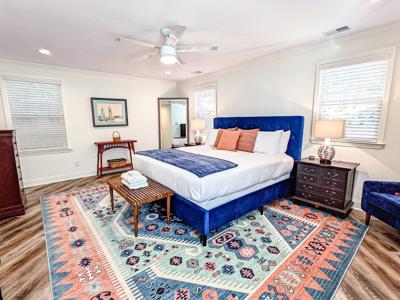COLUMBIA — Soon after newlyweds David and Wendy Bergmann bought their first home, the couple decided to list their house on Airbnb for the total solar eclipse set to pass over South Carolina in 2017, thinking they could reinvest the proceeds into renovations.
The Bergmanns soon found they could easily rent out their home for college football games or weekends when they were out of town. Soon, other people asked the pair to manage their Airbnbs.
Today, their company Heartwood Furnished Homes manages roughly 60 short-term rental homes in the Columbia area for property owners. The Bergmanns account for more than 6 percent of the Columbia region's short-term rental market.
"That's kind of how we got into it, was we wanted to plan for the future," Wendy Bergmann said. "We wanted to invest in something."
But what has become a popular side gig, investment strategy and source of cash flow for many around the country could be greatly reduced in South Carolina's capital city.
Columbia city government is mulling an ordinance that would eliminate the practice for non-owner occupied properties in residential neighborhoods, hobbling the growing industry and impacting entrepreneurs who have carved out a niche in the market.
Rules regulating short-term rentals vary widely across the state. In Greenville, short-term rentals are prohibited in certain residential areas except with a special zoning exception. Mount Pleasant capped the number of short-term rental units at 1 percent of all residential units in the town and requires a property manager able to respond to any emergency calls within 60 minutes.
"These businesses are operating like boutique hotels," Columbia City Councilman Howard Duvall said. "In my opinion, a non-owner occupied short-term rental is a commercial building and does not need to be in a residential area."
While politicians are trying to clamp down on the industry, the short-term rental market is relatively small in the Columbia metro area — 15 percent of the size of vacation hot spots like Myrtle Beach.
The state's second-largest metro area has 944 properties actively listed on short-term rental websites, such as Airbnb and VRBO, according to the market research company AirDNA. Of those, 673 properties are within Columbia city limits — compared to 747 in Greenville, 7,614 in Myrtle Beach, and 6,248 in and around Charleston.
AirDNA breaks down the data further, showing 83 percent of those Columbia listings are full-home or guest house rentals, an indicator of a possible investment property. Only about 35 percent of the listings are available for rent year round.
Property owners who don't live on site and offer up homes as short-term rentals are already required to register for a permit with city code enforcement officials, the same as long-term rentals. And Airbnb collects sales and accommodations tax dollars that are remitted to the state and cities.
The practice also fills a need as hotels around the Columbia area often book up for University of South Carolina football games or when the Masters Tournament is held in Augusta, Ga., a little more than an hour west of Columbia.
When it comes to the customer base for short-term rentals, the Bergmanns say they see a lot of parents of USC students who come to Columbia to see their kids. Fort Jackson, with its nearly weekly Army basic training graduation ceremonies, is another driver of visits.
Heartwood also usually has about a dozen travel nurses, who work for 13-week stints in area hospitals, staying in the properties it manages.
Recreational travel is less common, with only the occasional Congaree National Park visitor. The Bergmanns even had people stay in their properties when Widespread Panic played a concert at Township Auditorium in February.
It can be a lucrative business.
As a rule of thumb, long-term rental properties generally bring in about $200 per month after the mortgage and other expenses are paid, said Graeme Moore, founder of the Moore Company Columbia-based real estate and property management firm. Short-term rental owners can turn a greater profit, he said.
The average nightly rate charged in Columbia is $150, according to AirDNA. The average occupancy is 65 percent and median monthly revenue tops $1,900.
The median monthly home payment in South Carolina is $1,250, according to the latest data from the U.S. Census Bureau. This includes the cost of mortgage payments, as well as insurance costs, property taxes, utilities and homeowners association fees.
The Bergmanns properties are full nearly every weekend and more than half of weekdays. They employ about a dozen people and partner with businesses like Cromer's P-Nuts and Oliver Gospel Roastery to supply their guests with local products.
Among some of the properties they manage are a house on Lake Murray that a couple rents out any weekend they aren't staying in it themselves and the home a father stays in with his daughter when the pair comes to Columbia for dance competitions.
Even former Mayor Steve Benjamin is getting into the trend. Benjamin purchased a home in Columbia’s historic Robert Mills district with plans to make it an event space, according to a report by The State. The property at 1329 Blanding St. comes with triplex, which he reportedly plans to list on Airbnb.
Of the property owners the Bergmanns manage accommodations for, two-thirds live in South Carolina. And for many it's just a single investment. Only a couple of their clients own more than one rental property.
"It's a little bit more of an approachable way for people to find some financial independence for themselves," Wendy Bergmann said of short-term rental investment.
But Duvall, the city councilman, worries that if more people choose to invest in property for short-term rental, the business could become a nuisance.
He said he already gets emails from constituents on a monthly basis about short-term rentals where renters host large, loud gatherings and take up street parking.
City Councilman Will Brennan does not think the full council is likely to go as far as barring short-term rentals in neighborhoods when a homeowner isn't present, but said more is likely needed to improve enforcement of city laws surrounding the industry, like a local contact person for each property.
"We need someone Columbia Police Department can call at 2 a.m. when there's an issue," he said.
Some of the neighborhoods where council members have received complaints include Elmwood Park, Earlewood, Wheeler Hill, Rosewood, Wales Garden, Shandon and neighborhoods behind the Dorn V.A. hospital, Duvall and Brennan said. But often those complaints are registered with law enforcement.
A special City Council committee, of which Duvall and Brennan are members, has been researching ordinances in other cities, from Charleston to Clemson and Raleigh to Asheville, N.C. Duvall hopes to begin holding public input sessions on the proposed ordinance in the next couple months.
Lexington County has also discussed the matter, though no action has been taken at this time.
But the Bergmanns say requiring these properties that are owned by investors who don't live on site to be commercially zoned will cut into their business.
"The whole purpose of short-term rentals is that they're people's homes," David Bergmann said.
The Bergmanns and many of the other owners of short-term rental properties who have provided feedback to City Council to date agree there should be some form of regulation, perhaps an onsite parking requirement or a management company for those who don't live in town.
"Most of the hosts that I met, it was really their one rental property or their one guest house, and they just see short-term rentals as an opportunity to have a better investment opportunity," David Bergmann said. "And we all were saying the same thing, which is we don't mind regulations, we just want them to be fair to us."










